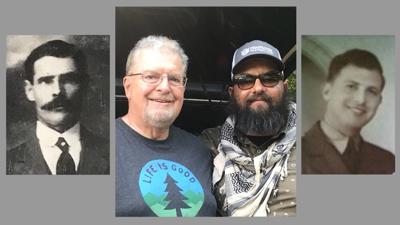The goddess, Thetis, prophesied to her demigod son, Achilles, that if he went to Troy, he would die a warrior’s death. But she also told him poets would sing of his glorious victories in the Trojan War for thousands of years to come. His name would be remembered.
Thetis also foresaw an alternate reality for Achilles — a reality where, if he remained behind in Greece, he would marry, father many children, and enjoy a peaceful life surrounded by a loving family. She told him, however, that though he would be honored and remembered by his family, his name, over time, would eventually be lost to history.
Achilles made his choice, and his mother’s prophecy of glorious remembrance came true. He found his immortality in the panoply of war.
We all seek some form of remembrance.
Fatherhood is generational — whether great-grandfather, grandfather or father, it is all the same. It has evolved over time but means pretty much the same thing in most cultures today.
My grandchildren remember my son on Father’s Day, but usually drop me a line as well. I like it — remembrance is an important thing to me. And, after all, I did have a hand in shaping their future — indeed their very existence.
I think often of my grandchildren, and I also think of my parents and grandparents. I think of their progeny, and the generational rippling effect that reaches down to succeeding generations.
My Grandfather Bachmann was an immigrant who arrived at Ellis Island from Germany at the turn of the 20th century. Richard was a manual laborer, fought in World War I, and settled in Chicago, where he married a local girl, Anna, and raised two sons. He was an elevator operator in one of Chicago’s skyscrapers and died just prior to World War II.
My Grandfather Schmidtlein was also a German immigrant but arrived in Galveston, Texas, from Ukraine at about the same time. Having served in the Czar’s army, Matthew sought a new life for his family free from war. He and his wife, Anastasia, settled in Independence, Mo., and had 11 children together. He worked as a boiler maker for the Santa Fe railroad and died during World War II.
Beyond the meager biographical data notating their lives, history will neither remember the strength of character of Richard Bachmann or Matthew Schmidtlein nor the hardships they endured on behalf of their families. In the present they only live on in the recollections of their children, but over time those recollections will fade and eventually be forgotten.
I lament the fact that I never knew my grandfathers; they both died before I was born. I am grateful, however, for inherited stories – stories of steadfast character, wisdom and fatherly love. As an eager grandchild, I never tired of retelling. The knowledge helped me solidify who I was and also filled a gap in my upbringing.
When my father returned from World War II, he suffered from PTSD and was never able to fully regain his pre-war self. He was incomplete, and I sought familial relationships with other male members of our family. They tried to guide me, but as they all had their own families, their guidance was intermittent. I, like my father, was incomplete and without an active father figure, I struggled.
When I became a father, I was in trial-and-error mode. I stumbled many times and was forced to live with regrets — some small and some large. And now, with the passage of time, I can only hope my children will not judge me too harshly — that they will always remember they had their father’s love.
As I mentioned earlier, remembrance is an important thing. It is instinctual.
A father wants a part of him to live on through his descendants, not only through his DNA but through his values and beliefs. He wants his dreams and aspirations to help shape his children, their children and the children that are yet to come.
A father wants to be remembered, and he is willing to fight for it.
The battles he fights are not the epic engagements of an Achilles, but the tedious struggles that the harshness of the world imposes upon him. There are no glorious victories here. A father’s struggles gain little recognition — recognition usually comes later in life as children mature and become parents themselves.
It is not fully realized that fathers act more out of love than anything else. Simply put, they want better lives for their children than they had. They want them to be better people than they are. And, if their children soar beyond expectation, they are proud of their achievements.
This is the remembrance — the immortality fathers seek. It is not so just for present generations, but for past generations and for the generations that are yet to come.
There will probably be no poet to immortalize a father’s accomplishments beyond the testament of those whose lives he has directly touched. All must be content in the knowledge that the fruits of fatherhood will be passed on to unknowing future generations.
Maybe this is a small thing; but hopefully, it is enough.
May you all enjoy this very special day.
***
Stops Along the Way is an award-winning column from Orlean resident Don Bachmann. Bachmann's column won first place in the online division of the 2022 Virginia Press Association Contest.


(0) comments
Welcome to the discussion.
Log In
Keep it Clean. Please avoid obscene, vulgar, lewd, racist or sexually-oriented language.
PLEASE TURN OFF YOUR CAPS LOCK.
Don't Threaten. Threats of harming another person will not be tolerated.
Be Truthful. Don't knowingly lie about anyone or anything.
Be Nice. No racism, sexism or any sort of -ism that is degrading to another person.
Be Proactive. Use the 'Report' link on each comment to let us know of abusive posts.
Share with Us. We'd love to hear eyewitness accounts, the history behind an article.